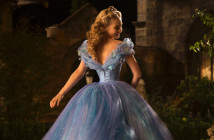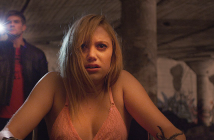
Werckmeister Harmonies (2000)
Cast: Lars Rudolph, Peter Fitz, Hanna Schygulla
Director: Béla Tarr, Ágnes Hranitzky
Country: Hungary | Italy | Germany | France
Genre: Drama | Mystery
Editor’s Notes: The following review is part of Next Projection Presents Apocalyptic Poetry: The Films of Bela Tarr. Please look out for more of our original series throughout 2015.
Since the passenger train connecting the icebound estates of the southern lowlands, which extend from the banks of the Tisza almost as far as the foot of the Carpathians, had, despite the garbled explanations of a haplessly stumbling guard and the promises of the stationmaster rushing nervously on and off the platform, failed to arrive (‘Well, squire, it seems to have disappeared into thin air again . . .’ the guard shrugged, pulling a sour face), the only two serviceable old wooden-seated coaches maintained for just such an ‘emergency’ were coupled to an obsolete and unreliable 424, used only as a last resort, and put to work, albeit a good hour and a half late, according to a timetable to which they were not bound and which was only an approximation anyway, so that the locals who were waiting in vain for the eastbound service, and had accepted its delay with what appeared to be a combination of indifference and helpless resignation, might eventually arrive at their destination some fifty kilometres further along the branch line.
Rarely have words the heft of László Krasznahorkai’s: the Hungarian author, whose dystopian tomes manifest in technique and tone the terrifying banality with which we crawl toward death, doesn’t so much tell stories as intone them, the incessant trudge of his behemoth sentences rendering the reader profligate with the enormity of their exertion. To read a novel like The Melancholy of Resistance is to designate oneself a syntactical Sisyphus, pushing this punishing prose to the brink of comprehension before being flattened anew by the force of its gravity. It is a language hewn in time, each syllable a second of our life that passes by as its sound passes our lips—Krasznahorkai’s words have an uncanny ability to force the reader to utter them aloud—and then again, clauses necessarily revisited like fresh memories ripe for the poring. If it’s a prose that seems predisposed to a surreal sense of l’esprit de l’escalier, it’s but with the sinister sensibility to set you back stumbling.
One need only hear the strains of Mihály Víg’s intransigently evocative instrumentation and see the pristinely-composed confrontation of man and beast to appreciate the essence of this film …
With both style and the story of which it’s in service so swaddled in a sense of Nietzschean nihilism, it’s little wonder Krasznahorkai’s work caught the ear of the meandering maestro Béla Tarr, whose earliest efforts in social realist cinema share a cyclical cynicism with the novelist’s words, and whose more expressionistic efforts immediately prior to their late-‘80s pairing betray a deep-seated discomfort with familiar modes of expression. If Satantango and Damnation—respectively the belated fruit of the pair’s first union and the fledgling fusion of their styles made while waiting for that epic’s funding—represent the honeymoon night fumbling of two singular artists uniquely attuned to the ontological essence of their respective media, Werckmeister Harmonies is the hybrid lovechild, a work of art all but alone in a literary cinema both borne on words and beyond them.

It’s telling that Tarr and Krasznahorkai—together, of course, with editor and co-director Ágnes Hranitzky—cohabit the “a film by” title card: to prescribe sole praise to one individual here would be as to designate humanity’s complexities the end result of one sole creative origin, be it divine or cosmic, buried within us or far beyond our understanding. No shortage of viewers, both admirers and not, have dubbed the film the latter, but like the furious and fearful villagers who gather round the gargantuan circus trailer that might be called the movie’s MacGuffin, they have missed the wood for the trees—or indeed the whale for the Prince.
The dichotomous notion of desolation and divinity alive in one instant, one object, one existence, is an idea Werckmeister Harmonies communicates in a way at once as literary as its subject and sublimely, singularly cinematic too.
One need only hear the strains of Mihály Víg’s intransigently evocative instrumentation and see the pristinely-composed confrontation of man and beast to appreciate the essence of this film: in gazing into the eye of this leviathan, our Valuska experiences an encounter with the sublime; in following his eye, so too do we. Commanding a seven-strong crew of cinematographers with a collective choreographic grace to put the cosmic ballet to shame, Tarr perfects the casually complicated shooting style he awkwardly initiated in his Macbeth and took to harrowing new heights with Satantango. There are rich rewards to be reaped in trawling through the traces of musicology and cosmology Krasznahorkai’s source story brings to bear, of pursuing political parallels in the iconography and action, but Werckmeister Harmonies is a movie that means no more to the viewer fervently scribbling than to the one sat beside, agape, agog.
There’s an astonishing passage in the novel—or rather an astonishing part of a passage; Krasznahorkai’s paragraphs are as exhaustingly extended as the sentences that compose them—in which a character outlines with acerbically extensive detail the eponymous melancholy of resisting the reality that “we are simply the miserable subjects of some insignificant failure, alone in this simply marvellous creation”. The dichotomous notion of desolation and divinity alive in one instant, one object, one existence, is an idea Werckmeister Harmonies communicates in a way at once as literary as its source and sublimely, singularly cinematic too. “How mysterious is the lord,” Valuska muses after seeing the whale and the crowd gathered around, “that he amuses himself with such strange creatures.” And how mysterious are we strange creatures, that we amuse ourselves with so strange a thing as art, and examine ourselves, and understand.
If Satantango and Damnation—respectively the belated fruit of the pair’s first union and the fledgling fusion of their styles made while waiting for that epic’s funding—represent the honeymoon night fumbling of two singular artists uniquely attuned to the ontological essence of their respective media, Werckmeister Harmonies is the hybrid lovechild, a work of art all but alone in a literary cinema both borne on words and beyond them.



